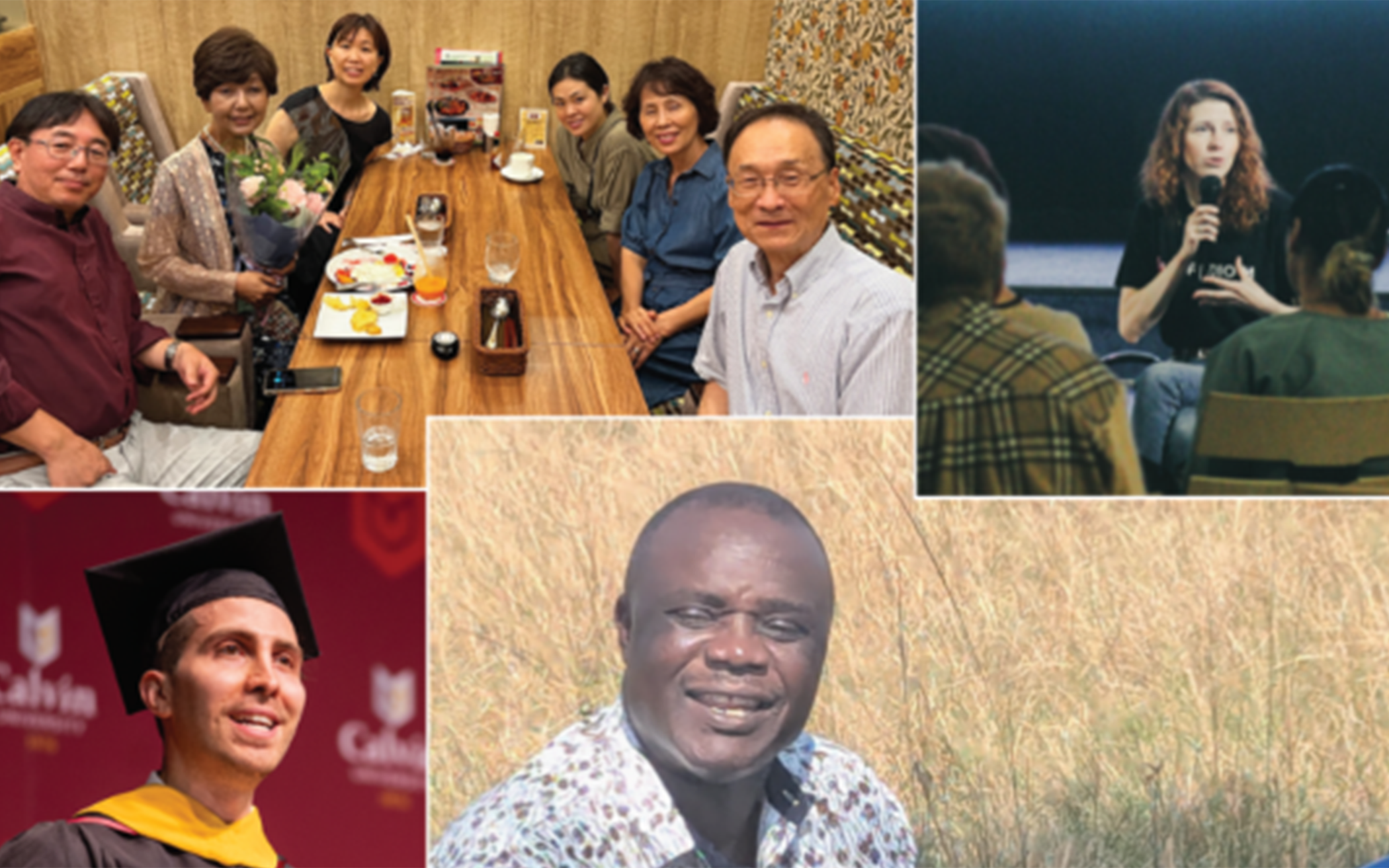Since its founding almost 170 years ago, the Christian Reformed Church in North America has valued doing kingdom work together by creating and funding shared ministries in which all members and churches could take part. These ministries include those that plant churches or share the gospel via missionaries, those that alleviate poverty and rebuild after natural disasters, those that equip local congregations to be stronger and more vital parts of their own neighborhoods, and those that share the good news via a variety of media outlets. They also include educational institutions and a seminary.
If you have ever contributed ministry shares, put money in your church’s collection plate, volunteered on a mission trip, or prayed for CRCNA ministries, then you are a vital component of these shared ministries. Below is a brief snapshot of some of what you are helping to make possible right now all around the globe.
In Africa: A Shared Vision for Building God’s Kingdom
By Kayleigh Van Wyk and Laurisa O’Brien, World Renew
Ecclesiastes 4:9 says, “Two are better than one, because they have a good return for their labor.” At World Renew, we witness that good return firsthand through our partnerships with churches and like-minded organizations around the globe.
In Uganda, World Renew partners with the Nebbi Diocese of the Church of Uganda. The Nebbi Diocese serves about 1 million people, many with the support of World Renew. Through this partnership, World Renew strengthens church capacity to carry out community transformation programs such as food security initiatives and savings groups that help families in Uganda improve their own livelihoods.
Leading the Nebbi Diocese is Bishop Pons Ozelle. Those who meet Ozelle describe him as a larger-than-life personality, yet he leads his congregation and shares God’s Word from a tiny office. He travels rugged roads to visit the communities the diocese serves, sometimes even hitching a ride on a motorcycle to get to church members. But Ozelle is also excitedly overseeing the building of a new church in his diocese, where he will soon have enough space to lead 5,000 people in worship.
Part of Ozelle’s ministry involves welcoming newcomers. As families flee rising violence and conflict in South Sudan, Uganda has welcomed more than a million displaced people. “They look like us,” Ozelle explained. “Many of them have family here.”
At the same time, the massive influx of people is straining the country’s resources and refugee response model. Ozelle wants to ensure refugees can find safety and welcome in his community. He extends his already-stretched budget to provide support to people who have resettled in the area. “You need your brother to take your hand and help lift you up,” Ozelle said. “You can’t do it alone.”
As Ozelle cares for the most vulnerable members of his community, he said he is grateful for the direction he receives from World Renew Uganda. “The partnership between Nebbi Diocese and World Renew has brought about marked positive impact,” Ozelle said, adding that he especially appreciates his diocese and World Renew’s “alike vision of building the kingdom of God.”
World Renew recognizes that our bonds with our partners are not simply business relationships, but relationships built on mutual respect, a common purpose, and a deep faith in God. Together we can continue furthering God’s kingdom and extending God’s compassion to those who need it most.
“The harvest is truly plenty,” Ozelle said, “and the Lord of the harvest is calling on all of us believers to take part.”
In Asia: Lost in Grief, Found in Christ
By Cassie Marcionetti, Resonate Global Mission
A gong sounded, followed by chanting, as Masahiro Kitamura kneeled on the temple floor. The air was heavy with the haze and scent of burning incense. Like many people in Japan, Kitamura had been raised in a Buddhist family. But lately he was starting to wonder more about the truth—and he wasn’t sure the Buddhist temple was where he was going to find answers.
With guidance from Resonate Global Mission missionary Jeong Gho, Masahiro found the truth in the Bible.
Less than 1 percent of Japan’s population identifies as Christian, but Resonate missionaries are working alongside local churches and believers to spread the gospel in the country.
While Masahiro had grown up kneeling on temple floors, his wife, Rie, was one of the few people in Japan who had grown up as a Christian. When the two married, Rie attended worship services less and less often and eventually stopped going altogether.
Then, within a few years, both of Rie’s parents died, and she was diagnosed with advanced pancreatic cancer. Her parents’ funerals brought her back to church for the first time in years. Her husband joined her at church for the first time in his life.
Reeling from grief and in search of hope, they started attending worship regularly. Masahiro Kitamura said he was “drawn to the word of the Bible,” but the couple felt out of place and weren’t sure whom to lean on.
And then one Sunday, Gho preached at the church. When he invited the congregation to stay after the service for a Bible study, the Kitamuras jumped at the opportunity.
Gho and Masahiro became fast friends. They spent many hours together, sharing meals and studying the Bible. The couple regularly joined online Bible studies—even from the hospital, where Rie’s health was rapidly deteriorating.
When Rie died, Gho was there for her grieving husband. As time passed, Masahiro became more certain that Jesus was the truth he had been searching for. He recently decided to commit his life to Christ and celebrated his baptism.
Masahiro is thankful that he has found a new identity in Christ and is comforted by the assurance that he will see his wife again someday. He said that Gho has been instrumental in his walk with Christ: “It's due to him that I was able to get to know Jesus more.”
In Central America: Calvin Alumnus Encourages Class of 2025 to Embrace Faithfulness, Vision, and Bold Obedience
By John Zimmerman, Calvin University
More than 900 members of Calvin University’s class of 2025 crossed the stage inside Van Noord Arena on May 10 cheered on by thousands of family, friends, and faculty. Degrees were awarded in 74 areas of study, including more than 120 master’s degrees and six four-year certificates through the university’s Life and Career Studies program, which serves students with intellectual disabilities.
Carlos Erazo, a 2013 graduate, pastor, and international content creator known for his digital ministry on YouTube and social media, gave the commencement address. Originally from El Salvador, Erazo shared his journey to Calvin—a path marked by uncertainty, faith, and God’s provision.
As a high school student in El Salvador, he applied to Calvin after the deadline at his mother’s urging. “You never know where God might open a door,” she told him. That step of faith eventually led him to a transformative experience on campus. He began to discover and lean into his passion for pastoral ministry and faith-based storytelling through social media—a calling that would later define his career.
“I was nervous. I didn’t know much. But I knew this: God brought me here, and his presence and grace were with me,” Erazo said.
From that foundation, Erazo shared three lessons that have shaped his life and vocation—lessons he challenged the graduates to carry forward.
First, pursue faithfulness over success. Erazo encouraged students to stay committed to their callings, even when outcomes seem uncertain or slow to develop. “Faithfulness is not fast,” he said. “It’s a long obedience in the same direction.” Referencing the parable of the talents and Galatians 6:9, he reminded the audience that God honors perseverance more than performance.
Second, expand your vision.
Erazo shared how a simple YouTube video inspired him to begin making faith-based content for friends back home in El Salvador, eventually leading to a full-time ministry in digital evangelism. “Your vision should be so big that it’s only possible if God accomplishes it through you,” he said, urging the class to dream beyond cultural expectations and into God’s purposes.
Third, be bold in obedience.
Reflecting on his post-graduation path, Erazo reminded students that faith doesn’t eliminate fear; it moves forward despite it. “There are people waiting on the other side of your obedience,” he said. “Make much of God’s glory, wherever he leads.”
Carlos encouraged graduates to live out Calvin’s mission: to think deeply, act justly, and live wholeheartedly as Christ’s agents of renewal.
In Europe: Supporting Women in War-torn Ukraine
By Christopher Hunt, ReFrame Ministries
A welcoming introduction opens the latest episode of Hugs, a radio program in Kyiv, Ukraine: “Hugs is a warm place for everyone who is waiting for their heroes.” Before introducing her guest, host Emma Sereda shares comments expressing anger from women whose loved ones have been fighting on the front line. Turning to her guest, a Christian psychologist, Sereda kicks off an in-depth discussion about dealing with anger in the fear and loss endemic to everyday life in war-torn Ukraine.
Sereda lives in Kyiv with her husband, Igor, and their two daughters, ages 8 and 4.
Hugs is part of a media mission called Embrace, which supports women whose husbands or sons are deployed on the front lines of the war with Russia. It can be heard throughout Ukraine, including in territories occupied by Russian forces. “Maybe it’s a mother whose husband serves in the army, and she is all alone,” Sereda said. “She’s doing all the things to care for her house, she needs to work to earn money, she needs to support everyone in the whole family. Or maybe they have lost their building because it was destroyed, and they have been forced to move to another city. We want to help people admit, ‘It’s OK that I’m not OK right now during the war.’” Discussion centers on biblical truths to help listeners see God as their main source of strength to cope with the war. It also emphasizes healthy processing of feelings and emotions.
Off the air, the Embrace project educates church leaders and volunteers on how to work with people affected emotionally and spiritually by war. “Sometimes Christians want to support someone,” Sereda said, “but they use Christian vocabulary like ‘It's OK; God will help you! Everything will be good!’ But people in the middle of depression or anxiety will not understand these words correctly, so we need to know how to speak with them to touch their hearts” without adding to their burdens. Sereda and her partners equip volunteers to host nightly Zoom prayer meetings to help women experience a little peace in very tough circumstances. Just hearing someone pray can be very comforting. One goal is to connect participants to a local church so they may join worship services and Bible studies.
How can we pray for Sereda and her ministry? “First for peace,” she said, but also for support for workers and volunteers. It is very difficult to remain positive and upbeat when they suffer from the very same struggles. Finally, Sereda asks for prayers for spiritual awakening. “We really see a huge wave of awakening in Ukraine right now,” she said, noting that the worry and fear surrounding the war have opened many people’s hearts to the gospel.
In North America: New Intercultural Congregations Network
By Victoria Veenstra, Canadian Justice Ministries
The explosion of cultural diversity in Canada since World War II is increasingly reflected in Christian Reformed congregations across the country. What was once known as a Dutch immigrant denomination is now the spiritual home and church community of people with dozens of ethnic and cultural backgrounds.
Adapting to this diversity can be challenging. That’s why the CRCNA’s Intercultural Ministry office has introduced the Intercultural Congregations Network, an initiative designed to connect several CRCNA congregations experiencing multicultural growth. The goal is to help them foster unity and participate in God’s work across cultures.
Building on the work of a pilot cohort of churches that began this work a year ago, the network will serve as a hub for resources, personalized coaching, and collaborative learning to help churches truly integrate and empower visitors, newcomers, and longtime members from all backgrounds.
“We know congregations are eager to grow in this area, and we’ve gathered and developed practical tools to help them do just that,” said Jeremiah Bašurić, co-senior leader for Intercultural Ministry.
A key offering of the Intercultural Congregations Network is expert coaching tailored to each church’s unique context. Co-senior leader Sebastian Maldonado emphasized, “It’s about meeting churches where they are and helping them develop a tailored approach to their specific context,” co-senior leader Sebasitan Maldonado said. “This isn’t a one-size-fits-all model; it’s about empowering local leaders with the wisdom they need.”









